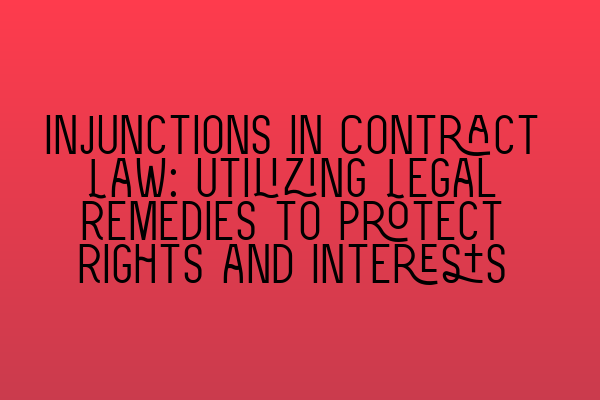Injunctions in Contract Law: Utilizing Legal Remedies to Protect Rights and Interests
Introduction
In contract law, disputes and conflicts can arise between parties involved in a contractual agreement. When one party fails to fulfill their obligations or breaches the terms of the contract, the affected party may seek legal remedies to protect their rights and interests. One powerful tool available in such situations is an injunction. In this blog post, we will explore the concept of injunctions in contract law, their importance, and how they can be utilized to safeguard the parties’ rights and interests.
Understanding Injunctions
An injunction is a legal remedy sought from a court that requires a party to either perform a specific action or refrain from doing something. In contractual disputes, injunctions serve as a preventative measure to stop the breaching party from causing further harm or to compel them to fulfill their contractual obligations.
Types of Injunctions
1. Injunctions to Restrain Breach of Contract
When a party fails to meet their contractual obligations, the injured party can seek an injunction to restrain the breaching party from continuing their actions. This type of injunction prevents the breaching party from causing further damage and allows the injured party to seek damages or specific performance.
2. Injunctions to Prevent Misrepresentation
If one party makes false statements or misrepresents certain facts during the negotiation or performance of a contract, the aggrieved party can seek an injunction to prevent further misrepresentation. This type of injunction can help protect the injured party’s interests and maintain the integrity of the contractual relationship.
3. Injunctions to Prevent Confidentiality Breach
Many contracts contain confidentiality clauses, requiring parties to keep certain information confidential. If one party breaches this obligation by disclosing confidential information to a third party, the affected party can seek an injunction to prevent the breach and protect their sensitive information.
4. Injunctions to Prevent Unfair Competition
In some cases, a party may engage in unfair competition practices, such as using trade secrets, trademarks, or confidential information obtained through a contractual relationship. Injunctions can be sought to prevent such unfair competition and preserve the injured party’s competitive advantage.
The Importance of Injunctions in Contract Law
1. Protecting Rights and Interests
Injunctions play a crucial role in protecting the rights and interests of the parties involved in a contractual agreement. They provide an immediate and effective remedy to halt actions that may cause irreparable harm. By seeking an injunction, a party can stop the breaching party from causing further damage while resolving the dispute through legal channels.
2. Ensuring Compliance with Contractual Obligations
An injunction can compel the breaching party to fulfill their contractual obligations or refrain from actions that contravene the terms of the agreement. By doing so, an injunction ensures that the contract is upheld and that both parties are held accountable for their commitments.
3. Preserving Confidentiality and Integrity
Injunctions can protect the confidentiality and integrity of a contractual relationship. By preventing the disclosure of sensitive or confidential information, an injunction safeguards the interests of the party concerned and maintains the trust and integrity between the contracting parties.
Conclusion
Injunctions are an invaluable legal remedy in contract law that enable parties to protect their rights and interests. Whether it is restraining a breach of contract, preventing misrepresentation, preserving confidentiality, or preventing unfair competition, injunctions play a pivotal role in resolving conflicts and ensuring compliance with contractual obligations. If you find yourself in a contractual dispute, seeking the appropriate legal remedies, including injunctions, can be crucial to safeguarding your rights and interests.
Related Articles:
– Securing Training Contracts: A Roadmap to Becoming a Solicitor
– Mentorship for Aspiring Solicitors: Nurturing Talent in the Legal Field
– Legal Challenges and Pitfalls: Navigating the Complexities of the Legal System
– The GDL (Graduate Diploma in Law): A Pathway to Becoming a Solicitor
– Mastering the Solicitor’s Path: Prepare for the Journey Ahead
